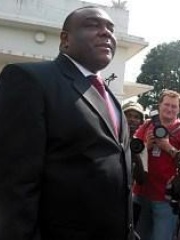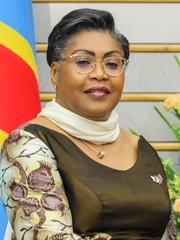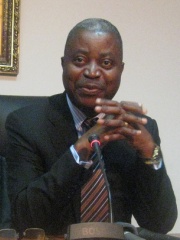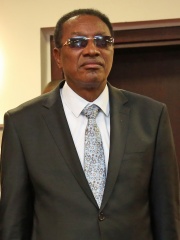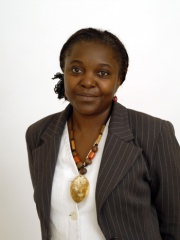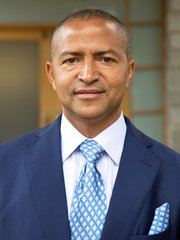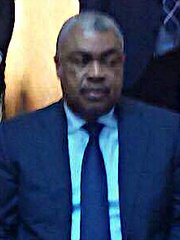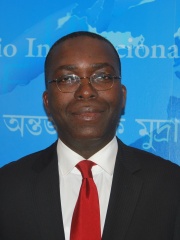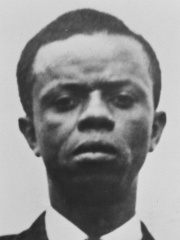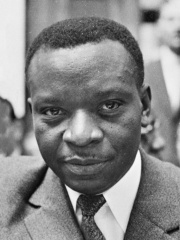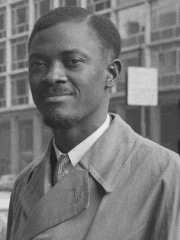
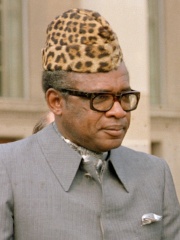
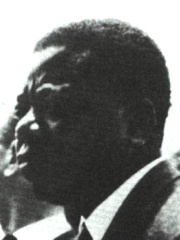
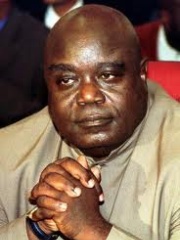
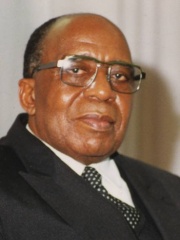
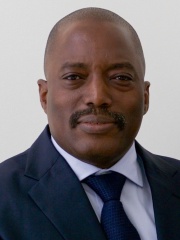
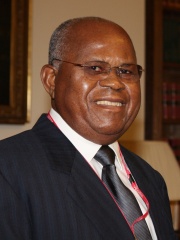
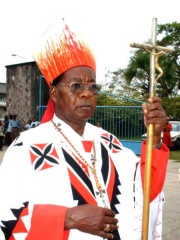
The Most Famous
POLITICIANS from Democratic Republic of the Congo
This page contains a list of the greatest Congolese Politicians. The pantheon dataset contains 19,576 Politicians, 21 of which were born in Democratic Republic of the Congo. This makes Democratic Republic of the Congo the birth place of the 106th most number of Politicians behind Honduras, and Ghana.
Top 10
The following people are considered by Pantheon to be the top 10 most legendary Congolese Politicians of all time. This list of famous Congolese Politicians is sorted by HPI (Historical Popularity Index), a metric that aggregates information on a biography's online popularity. Visit the rankings page to view the entire list of Congolese Politicians.

1. Patrice Lumumba (1925 - 1961)
With an HPI of 78.45, Patrice Lumumba is the most famous Congolese Politician. His biography has been translated into 97 different languages on wikipedia.
Patrice Émery Lumumba ( pə-TREESS luu-MUUM-bə; born Isaïe Tasumbu Tawosa; 2 July 1925 – 17 January 1961) was a Congolese politician and independence leader who served as the first prime minister of the Democratic Republic of the Congo (then known as the Republic of the Congo) from June until September 1960, following the May 1960 election. He was the leader of the Congolese National Movement (MNC) from 1958 until his assassination in 1961. Ideologically an African nationalist and pan-Africanist, he played a significant role in the transformation of the Congo from a colony of Belgium into an independent republic. Shortly after Congolese independence in June 1960, a mutiny broke out in the army, marking the beginning of the Congo Crisis. After a coup, Lumumba attempted to escape to Stanleyville to join his supporters who had established a new anti-Mobutu state called the Free Republic of the Congo. Lumumba was captured en route by state authorities under Joseph-Désiré Mobutu, sent to the State of Katanga and, with the help of Belgian mercenaries, tortured and executed by the separatist Katangan authorities of Moïse Tshombe. In 2002, Belgium formally apologised for its role in the execution, admitting "moral responsibility", and in 2022, they returned Lumumba’s tooth to his family. He is seen as a martyr for the pan-African movement.

2. Mobutu Sese Seko (1930 - 1997)
With an HPI of 77.52, Mobutu Sese Seko is the 2nd most famous Congolese Politician. His biography has been translated into 77 different languages.
Mobutu Sese Seko Nkuku Ngbendu wa za Banga ( mə-BOO-too SESS-ay SEK-oh; born Joseph-Désiré Mobutu; 14 October 1930 – 7 September 1997), often shortened to Mobutu Sese Seko or Mobutu and also known by his initials MSS, was a Congolese politician and military officer who was the first and only president of Zaire from 1971 to 1997. Previously, Mobutu served as the second president of the Democratic Republic of the Congo, from 1965 to 1971. He also served as the fifth chairperson of the Organisation of African Unity from 1967 to 1968. During the Congo Crisis in 1960, Mobutu, then serving as Chief of Staff of the Congolese Army, deposed the nation's democratically elected government of Patrice Lumumba with the support of the U.S. and Belgium. Mobutu installed a government that arranged for Lumumba's execution in 1961, and continued to lead the country's armed forces until he took power directly in a second coup in 1965. To consolidate his power, he established the Popular Movement of the Revolution as the sole legal political party in 1967, changed the Congo's name to Zaire in 1971, and his own name to Mobutu Sese Seko in 1972. Mobutu protected his rule through an intensely totalitarian regime and came to preside over a period of widespread human rights violations. He attempted to purge the country of all colonial cultural influence through his program of "national authenticity". Mobutu was the object of a pervasive cult of personality. Mobutu claimed that his political ideology was "neither left nor right, nor even centre", but was primarily recognized for his opposition to communism within the Françafrique region and received strong support (military, diplomatic and economic) from the United States, France, and Belgium as a result. He also built close ties with the governments of apartheid South Africa and Israel. As a result of the Sino-Soviet split, Mobutu also established close relations with China. Mobutu was notorious for corruption and nepotism: estimates of his personal wealth range from $50 million to $5 billion, amassed through economic exploitation and corruption as president. His rule has been called a kleptocracy for allowing this personal fortune even as the economy of Zaire suffered from uncontrolled inflation, a large debt, and massive currency devaluations. Mobutu was further known for extravagances such as shopping trips to Paris via the supersonic Concorde aircraft. By 1990, economic deterioration and unrest forced Mobutu Sese Seko into a coalition with political opponents and to allow a multiparty system. Although he used his troops to thwart change, his antics did not last long. In May 1997, rebel forces led by Laurent-Désiré Kabila overran the country and forced him into exile. Already suffering from advanced prostate cancer, he died three months later in Morocco.

3. Moïse Tshombe (1919 - 1969)
With an HPI of 72.77, Moïse Tshombe is the 3rd most famous Congolese Politician. His biography has been translated into 35 different languages.
Moïse Kapenda Tshombe (sometimes written Tshombé; 10 November 1919 – 29 June 1969) was a Congolese businessman and politician. He served as the president of the secessionist State of Katanga from 1960 to 1963 and as prime minister of the Democratic Republic of the Congo from 1964 to 1965. Tshombe was born to an aristocratic Lunda family and ran several businesses in Katanga Province before becoming involved in politics, cofounding the pro-Western, anti-communist CONAKAT party in 1958 and advocating for autonomy for Katanga province. Following the country's accession to independence in June 1960, Tshombe became president of the autonomous province, and soon came into conflict with the central government's leftist prime minister, Patrice Lumumba. Accusing Lumumba of communist sympathies, Tshombe declared Katanga's independence as the breakaway State of Katanga, becoming a major actor of the Congo Crisis. Following Lumumba's overthrow and execution by Tshombe's supporters in 1961, the Katanga rebellion was suppressed in 1963, forcing Tshombe into exile. The following year, he was made prime minister of the country as part of a new coalition government against the Simba rebellion by Lumumba's supporters. In 1965, he founded the CONACO alliance, which comfortably won the March and April general elections. However, he was dismissed as Prime Minister in October of that year, being replaced by Évariste Kimba. Following the November 1965 coup which ended the Congo Crisis, he was charged with treason and was forced into exile again. He died four years later under disputed circumstances.

4. Laurent-Désiré Kabila (1939 - 2001)
With an HPI of 71.50, Laurent-Désiré Kabila is the 4th most famous Congolese Politician. His biography has been translated into 55 different languages.
Laurent-Désiré Kabila (French pronunciation: [lo.ʁɑ̃ de.zi.ʁe ka.bi.la]; 27 November 1939 – 16 January 2001) usually known as Laurent Kabila or Kabila the Father (US: ), was a Congolese rebel and politician who served as the third president of the Democratic Republic of the Congo from 1997 until his assassination in 2001. Kabila initially gained prominence as an opponent of Mobutu Sese Seko during the Congo Crisis (1960–1965). He took part in the Simba rebellion and led the Communist-aligned Fizi rebel breakaway state in eastern Congo from 1967 to 1988 before disappearing from public. In the 1990s, Kabila re-emerged as leader of the Alliance of Democratic Forces for the Liberation of Congo (ADFL), a Rwandan and Ugandan-sponsored rebel group that invaded Zaire and overthrew Mobutu during the First Congo War from 1996 to 1997. Following the war, Kabila became the new president of the country, whose name was changed back to the Democratic Republic of the Congo. The following year, he ordered all foreign troops to leave the country following the Kasika massacre to prevent a potential coup, leading to the Second Congo War (1998–2003), in which his former Rwandan and Ugandan allies supported several rebel groups to overthrow him. In 2001, he was assassinated by one of his bodyguards, and was succeeded by his 29-year-old son Joseph.
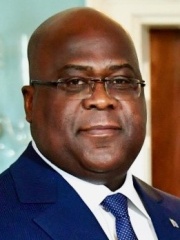
5. Félix Tshisekedi (b. 1963)
With an HPI of 65.85, Félix Tshisekedi is the 5th most famous Congolese Politician. His biography has been translated into 62 different languages.
Félix Antoine Tshisekedi Tshilombo (French: [feliks ɑ̃twan tʃisekedi tʃilombo]; born 13 June 1963) is a Congolese politician who has served as the fifth president of the Democratic Republic of the Congo, since 2019. He was the leader of the Union for Democracy and Social Progress (UDPS), the DRC's oldest and largest party, succeeding his late father Étienne Tshisekedi in that role, a three-time Prime Minister of Zaire and opposition leader during the reign of Mobutu Sese Seko. Tshisekedi was the UDPS party's candidate for president in the December 2018 general election, which he was awarded, despite accusations of irregularities from several election monitoring organisations and other opposition parties. The Constitutional Court of the DRC upheld his victory after another opposition politician, Martin Fayulu, challenged the result, but Tshisekedi has been accused of making a deal with his predecessor, Joseph Kabila. The election marked the first peaceful transition of power since the DRC's independence from Belgium in 1960. Since the Common Front for Congo (FCC) coalition, which is aligned with Kabila, still controlled the parliament and provincial governorships, Tshisekedi's ability to govern or even appoint a new Prime Minister was limited for the first six months of his term. He named his coalition partner and political heavyweight, Vital Kamerhe, as his Chief of Cabinet, at first having designated him prime minister but not having the parliamentary support to have him successfully appointed. In May 2019, he reached a deal with the parliament's Kabila-aligned majority to appoint Sylvestre Ilunga prime minister. On 27 July 2019, negotiations finally ended between Tshisekedi and the parliament, agreeing on the formation of a new cabinet. On 19 May 2024, there was a failed coup attempt against Tshisekedi, led by a group including opposition politician Christian Malanga. The attempted coup resulted in six deaths, including Malanga.

6. Antoine Gizenga (1925 - 2019)
With an HPI of 63.94, Antoine Gizenga is the 6th most famous Congolese Politician. His biography has been translated into 36 different languages.
Antoine Gizenga (5 October 1925 – 24 February 2019) was a Congolese politician and statesman who served as the prime minister of the Democratic Republic of the Congo from 30 December 2006 to 10 October 2008. He was the secretary-general of the Unified Lumumbist Party (PALU).

7. Joseph Kabila (b. 1971)
With an HPI of 62.71, Joseph Kabila is the 7th most famous Congolese Politician. His biography has been translated into 67 different languages.
Joseph Kabila Kabange ( kab-EE-lə, French: [ʒozɛf kabila]; born 4 June 1971) is a Congolese politician and former military officer who was the fourth President of the Democratic Republic of the Congo from 2001 to 2019. He took office ten days after the assassination of his father, President Laurent-Désiré Kabila, in the context of the Second Congo War. He was allowed to remain in power as the president of the new transitional government after the 2002 peace agreements ended the war. Kabila founded the People's Party for Reconstruction and Democracy (PPRD) and was elected president in 2006. He was re-elected for a second term in 2011. Since stepping down after the 2018 election, Kabila, as a former president, is a senator for life. Kabila was the country's second-longest serving president. Kabila was born in Hewa Bora II, a village in the present-day South Kivu Province of the eastern DRC. His father, Laurent-Désiré Kabila, lived in isolation while leading a dissident movement against the dictator Mobutu Sese Seko. The younger Kabila later received education and military training in Tanzania and Uganda. He studied at Makerere University before the First Congo War broke out in 1996. His father was a founding member of the Alliance of Democratic Forces for the Liberation of Congo-Zaire (AFDL) with Rwandan backing to overthrow Mobutu. Joseph Kabila participated in the war, which ended with his father becoming the president, and afterwards was sent to the PLA National Defense University in China. He was appointed as the deputy chief of staff of the Congolese Armed Forces, and after returning from China, was briefly the chief of staff in 1998, at the outbreak of the Second Congo War. In 2000, he became the chief of staff of the Land Forces. After his father's assassination, Kabila succeeded him as the president, and restarted the peace process that had previously stalled. He is credited with ending the Second Congo War and restoring relative stability to most of the country, though conflict later restarted in the east against rebel forces supported by neighboring Rwanda and Uganda. As the head of the transitional government, he helped organize electoral institutions and in 2006 presided over the DRC's first free multi-party election in decades. After that Kabila led an increasingly authoritarian government, and his re-election in 2011 was marred with accusations of fraud. During his tenure, he encouraged foreign investment in the mining industry and improved the infrastructure. The size of the country's economy increased by five times. However, the growth was highly unequal, and the majority of DR Congo's population still lived below the international poverty line by the time he left office. Kabila's government became known for cronyism, corruption, and human rights violations, including security forces killing protestors. The DRC consistently scored low in the Corruption Perceptions Index and The Economist Democracy Index. The United States and the European Union sanctioned associates of Kabila in 2016 and 2017 for corruption and undermining democracy. The DRC experienced a political crisis during the last years of Kabila's second term. His constitutional mandate was due to expire on 20 December 2016, according to the terms of the constitution adopted in 2006. Officials suggested that elections would be held in November 2016, but in September, the electoral commission announced that the election would not be held before early 2018. Kabila's popularity declined and he also faced growing pressure from the international community to give up power. An agreement was reached after mediation by the influential Catholic hierarchy to appoint a new government and prepare to hold elections, but they were delayed again. In August 2018, Kabila announced that he would step down and not seek a third term in the upcoming election that December. In January 2019, Kabila was succeeded by Félix Tshisekedi in the country's first peaceful transition of power. Independent observers concluded that Tshisikedi lost heavily to another candidate, Martin Fayulu, and that Kabila had fixed the official result for the candidate most likely to be helpful to him. He remained influential in the DRC's politics after he left office. Kabila's political alliance, the Common Front for Congo, initially held the majority of seats in the parliament and provincial governorships. It formed a coalition government in August 2019 with Tshisekedi's Heading for Change alliance after months of negotiations. Tshisekedi ended the coalition in December 2020 over the blocking of his agenda. In early 2021 he removed the last of Kabila's allies from the government, and in December 2023 Kabila went into self-imposed exile abroad. Tshisekedi accused him of supporting the resurgent campaign of the Rwandan-backed March 23 Movement (M23) in early 2025, which he denied. A Congolese military court tried Kabila in absentia for treason and in September 2025 sentenced him to death.

8. Étienne Tshisekedi (1932 - 2017)
With an HPI of 61.99, Étienne Tshisekedi is the 8th most famous Congolese Politician. His biography has been translated into 26 different languages.
Étienne Tshisekedi wa Mulumba also Known as Tshisekedi The Father (14 December 1932 – 1 February 2017) was a Congolese politician and the leader of the Union for Democracy and Social Progress (UDPS), formerly the main opposition political party in the Democratic Republic of the Congo (DRC). A long-time opposition leader, he served as Prime Minister of the country (then called Zaire) on three brief occasions: in 1991, 1992–1993, and 1997. He was also the father of the current President, Felix Tshisekedi. Tshisekedi was the main Congolese opposition leader for decades. Although he served in the government of Mobutu Sese Seko in various positions, he also led the campaign against Mobutu, and was one of few politicians who challenged the dictator. Tshisekedi and his UDPS party boycotted the 2006 elections organized in Congo on claims that elections were fraudulent and were systematically rigged in advance. He was a candidate for President of Congo in the 2011 elections that many national and international observers, notably the Carter Center, have said lacked credibility and transparency. Having officially lost to incumbent Joseph Kabila, Tshisekedi nevertheless declared himself the "elected president" of Congo. Policemen and Kabila's presidential guards were subsequently stationed at every corner that gives entrance to Tshisekedi's residence, placing him under unofficial house arrest. His son Félix became president in 2019.

9. Frédéric Etsou-Nzabi-Bamungwabi (1930 - 2007)
With an HPI of 59.74, Frédéric Etsou-Nzabi-Bamungwabi is the 9th most famous Congolese Politician. His biography has been translated into 19 different languages.
Frédéric Etsou-Nzabi-Bamungwabi, C.I.C.M. (French pronunciation: [fʁedeʁik ɛtsun zabi bamœ̃ɡwabi]; 3 December 1930, Belgian Congo – 6 January 2007, Leuven, Belgium) was a Congolese Catholic prelate who served as Archbishop of Kinshasa from 1991 until his death in 2007. He was a member of the CICM Missionaries and was elevated to the cardinalate in 1991.

10. Sylvestre Ilunga (b. 1947)
With an HPI of 58.18, Sylvestre Ilunga is the 10th most famous Congolese Politician. His biography has been translated into 24 different languages.
Sylvestre Ilunga Ilunkamba (born 1947) is a Congolese politician who was appointed as the Prime Minister of the Democratic Republic of the Congo in May 2019, formally establishing his government in August 2019. He has had a long political career going back to the 1970s, having held a number of ministerial cabinet posts, and was previously a professor at the University of Kinshasa since 1979. Ilunga has also been the secretary general of Congo's national railway company. He has a reputation as an experienced public servant and technocrat, as well as an ally of former president Joseph Kabila.
People
Pantheon has 21 people classified as Congolese politicians born between 1919 and 1971. Of these 21, 12 (57.14%) of them are still alive today. The most famous living Congolese politicians include Félix Tshisekedi, Joseph Kabila, and Sylvestre Ilunga. The most famous deceased Congolese politicians include Patrice Lumumba, Mobutu Sese Seko, and Moïse Tshombe. As of April 2024, 3 new Congolese politicians have been added to Pantheon including Judith Suminwa, Moïse Katumbi, and Samy Badibanga.
Living Congolese Politicians
Go to all RankingsFélix Tshisekedi
1963 - Present
HPI: 65.85
Joseph Kabila
1971 - Present
HPI: 62.71
Sylvestre Ilunga
1947 - Present
HPI: 58.18
Jean-Pierre Bemba
1962 - Present
HPI: 56.00
Judith Suminwa
1967 - Present
HPI: 54.70
Laurent Nkunda
1967 - Present
HPI: 53.14
Adolphe Muzito
1957 - Present
HPI: 52.35
Bruno Tshibala
1956 - Present
HPI: 50.88
Cécile Kyenge
1964 - Present
HPI: 50.57
Moïse Katumbi
1964 - Present
HPI: 48.54
Samy Badibanga
1962 - Present
HPI: 46.33
Augustin Matata Ponyo
1964 - Present
HPI: 45.76
Deceased Congolese Politicians
Go to all RankingsPatrice Lumumba
1925 - 1961
HPI: 78.45
Mobutu Sese Seko
1930 - 1997
HPI: 77.52
Moïse Tshombe
1919 - 1969
HPI: 72.77
Laurent-Désiré Kabila
1939 - 2001
HPI: 71.50
Antoine Gizenga
1925 - 2019
HPI: 63.94
Étienne Tshisekedi
1932 - 2017
HPI: 61.99
Frédéric Etsou-Nzabi-Bamungwabi
1930 - 2007
HPI: 59.74
Joseph Iléo
1921 - 1994
HPI: 55.88
Cyrille Adoula
1921 - 1978
HPI: 54.55
Newly Added Congolese Politicians (2025)
Go to all RankingsJudith Suminwa
1967 - Present
HPI: 54.70
Moïse Katumbi
1964 - Present
HPI: 48.54
Samy Badibanga
1962 - Present
HPI: 46.33
Overlapping Lives
Which Politicians were alive at the same time? This visualization shows the lifespans of the 9 most globally memorable Politicians since 1700.

